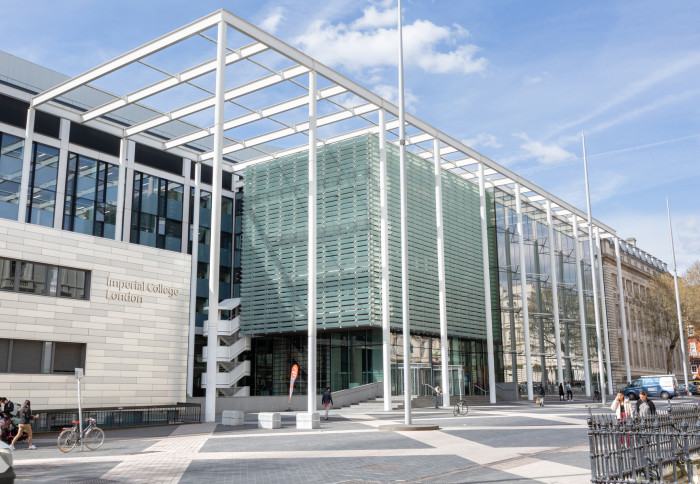Imperial signs science and innovation agreement with the University of Chicago

The new agreement formalises ties between the two universities, led by the Institute for Security Science and Technology.
Imperial College London has increased its trans-Atlantic ties by signing a new agreement with the University of Chicago.
The Memorandum of Understanding brings together two of the world’s leading universities, both ranked in the top 10 globally by the 2021 QS World Universities Rankings.
Under the agreement, there will be a particular focus on furthering connections between the Institute for Security Science and Technology (ISST) at Imperial, and the Pritzker School of Molecular Engineering at the University of Chicago.
Both institutes have significant expertise and capabilities in security and resilience and allied fields, and will build collaborative research and education work in three main areas:
- Next Generation Secure Communications: techniques and systems to enable secure communications in future infrastructure settings.
- AI and Machine Learning for Science: investigating the use of AI and ML techniques for the purpose of progressing insights in fundamental science.
- Resilience and Networks for Crises Planning and Response: Establishing networks of expertise in resilience, scenario modelling and threat analysis for large scale crises and security events.
The Memorandum of Understanding was signed on behalf of Imperial by Professor Deeph Chana, co-director of the Institute for Security Science and Technology, and on behalf of the University of Chicago by Professor Ka Yaa Lee, the Provost.
Professor Deeph Chana said:
“I am particularly happy to be signing this MoU with the University of Chicago which strengthens the relationship we established some time ago. The challenges we face in security and resilience are international in nature and require international collaboration if we are to solve them. We very much look forward to working more closely with our colleagues in Chicago.”
Professor Washington Ocheing, co-director of the Institute for Security Science and Technology (ISST), Imperial College London said:
“The work of the ISST and the rest of Imperial will benefit hugely from this connection to the University of Chicago, and especially the Pritzker School of Molecular Engineering and the connection to the Argonne National Laboratory. The two universities are recognised leaders in the areas of secure communications, resilience, infrastructure, AI and ML, and we see exciting things to come under the new agreement.”
Professor Juan de Pablo, Vice President for National Laboratories, Science Strategy, Innovation, and Global Initiatives at the University of Chicago said:
“Tackling grand challenges in security, resilience, and defense requires deep collaboration across institutions and across borders. We are thrilled to be joining the ISST’s network, bringing the University’s strengths in science, innovation, policy and business to such an eminent institution as Imperial College London. Already our institutional partnership is bearing fruit and we look forward to a very successful collaboration.”
ENDS
About Imperial College London
Imperial College London is one of the world’s leading universities. The College’s 17,000 students and 8,000 staff are expanding the frontiers of knowledge in science, medicine, engineering and business, and translating their discoveries into benefits for our society.
Imperial is the UK’s most international university, according to Times Higher Education, with academic ties to more than 150 countries. Reuters named the College as the UK’s most innovative university because of its exceptional entrepreneurial culture and ties to industry.
http://?www?.impe?r?i?al?.ac?.uk/
About the Institute for Security Science and Technology
The Institute for Security Science and Technology (ISST) is Imperial College London’s hub for security and resilience research, education and innovation. Founded in 2008 as one of Imperial’s global challenge institutes, ISST works with academics from across the College, as well as external partners from industry, academia and government, to help solve the grand challenges of security and resilience. ISST’s mission is to challenge the often narrow perception of security, and demonstrate the breadth and depth of a topic that touches everyone in society, wherever they are in the world.
https://www.imperial.ac.uk/security-institute/
About the University of Chicago
The University of Chicago is a leading academic and research institution that has driven new ways of thinking since its founding in 1890. As an intellectual destination, the University draws scholars and students from around the world to its campuses and centers around the globe. The University provides a distinctive educational experience and research environment, empowering individuals to challenge conventional thinking and pursue field-defining research that produces new understanding and breakthroughs with global impact.
The University of Chicago Booth School of Business anchors the University’s presence in the UK . A new campus near St Paul’s Cathedral, London is home to top ranked Executive MBA and Executive Education programs, and is a hub for regional academic, corporate and government partnerships.
www.uchicago.edu
www.chicagobooth.edu
Contact
ISST – Max Swinscow-Hall m.swinscow-hall@imperial.ac.uk
Article text (excluding photos or graphics) © Imperial College London.
Photos and graphics subject to third party copyright used with permission or © Imperial College London.
Reporter
Max Swinscow-Hall
Institute for Security Science & Technology